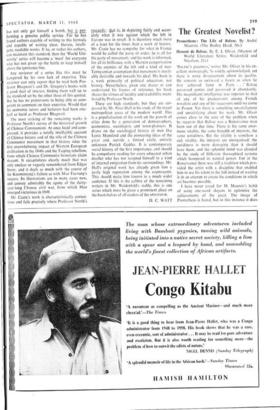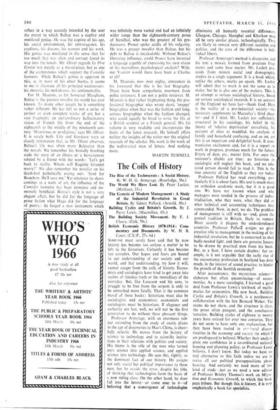The Greatest Novelist?
TALZAC'S greatness,' writes Mr. Oliver in his ex- cellent monograph, 'is widely acknowledged, yet there is more disagreement about its quality. He remains as awkward a figure as when he
first achieved fame in Paris. . . Balzac possessed genius and possessed it abundantly. His magnificent intelligence was superior to that of any of his predecessors among French novelists and any of his successors until we come to Proust. Yet there is something unsatisfactory and unsatisfying about his work. Mr. Oliver conies close to the core of the problem when he suggests that Balzac was a Renaissance man born out of due time. There is the same enor- mous vitality, the same breadth of interests, the same untidiness. But the vitality is somehow a sick vitality; the interests are unorganised; the untidiness is more damaging than it should have been, and the splendid mind was clouded by the study of fifth-rate theosophical systems which hampered its natural power. For at the Renaissance there was still a tradition which pro- vided the artist with a discipline that enabled him to use his talent to the full instead of wasting it in an attempt to create the conditions in which art becomes possible.
I have never cared for M. Maurois's habit of using one-word slogans to epitomise the achievements of the great. The image of Prometheus is banal, but in this instance it does
reflect in a way scarcely intended by the user the extent to which Balzac was a captive and mutilated genius. He was the captive of his age, his social environment, his extravagance, his creditors, his dreams, his women and his work. His genius was mutilated in the sense that far too much that was alien and corrupt found its way into the novels. Mr. Oliver regards Le Pere Goriot not merely as a masterpiece, but as one of the cornerstones which support the Comedie humaine. While Balzac's genius is apparent in this, as in most of his other books, it seems to me to illustrate all his principal weaknesses: his rhetoric, his melodrama, his sentimentality.
For M. Maurois, as for Somerset Maugham, Balzac is the greatest novelist the world has ever known. To many other people he is something rather different. He has left us not a series of perfect or even complete works of art, but a vast fragment: an extraordinary hallucinatory vision of French life from the end of the eighteenth to the middle of the nineteenth cen- tury. 'Monstrous or prodigious,' says Mr. Oliver. It is surely both. Life and literature were so closely interwoven that, as Mr. Oliver observes, Balzac's life was often more Balzacian than the novels. We remember his brutally brushing aside the story of an illness or a bereavement related by a friend with the words: 'Let's get back to reality. Whom will Eugenie Grandet marry?' We also remember the novelist on his death-bed pathetically crying out: 'Send for Bianchon. He'll save me.' Yet whatever its short- comings as a work of art, the influence of the Comedie humaine has been immense and im- mensely beneficial. Balzac's style is not a very elegant affair, but he did for the language of prose fiction what Hugo did for the language of poetry: he forged a new instrument which
was infinitely more varied and had an infinitely wider range than the eighteenth-century prose of Stendhal, who was the greatest of his pre- decessors. Proust spoke acidly of his vulgarity. He was a greater novelist than Balzac, but his debt to Balzac is incalculable. Without Balzac's liberating influence, could Proust have invented a language capable of expressing his own vision or his marvellous psychological analysis? With- out Vautrin would there have been a Charlus at all?
M. Maurois, now over eighty, announces in his foreword that this is his last biography. There have been sympathetic murmurs from polite reviewers. I am not a polite reviewer. M. Maurois is that rather frightening thing, the pro- fessional biographer who wrote short, 'snappy' biographies when that was the fashion and long, serious biographies when the fashion changed, who could equally be hired to write the life of a British scientist or a French general. His fat volume is very readable and incorporates the fruits of the latest research. He himself offers neither the insights of the writer nor the original research of the scholar. His work is the work of the well-trained man of letters. And nothing more.
MARTIN TURNELL







































 Previous page
Previous page